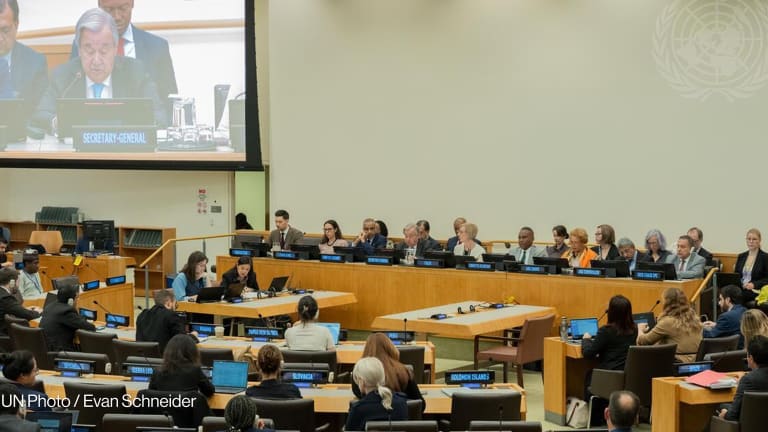United Nations Secretary-General Ban Ki-Moon was encouraged by his first meeting with U.S. Secretary of State Hilary Clinton on March 4, on the sidelines of the Gaza aid conference in Egypt. The next day, a handful of U.N. diplomats spoke optimistically about Ambassador Susan Rice and the Obama administration. Then Mark Storella, the U.S. acting ambassador in Geneva, called the mostly toothless Human Rights Council to account.This week's flurry of promising U.S.-U.N. interactions beg further analysis. In what may become a regular feature, Stewart Patrick, senior fellow and director of the program on international institutions and global governance at the Council on Foreign Relations, examined the Obama effect at the United Nations."The Bush administration showed that marginalizing the U.N. doesn't help us when we're trying to forge a consensus on humanitarian or other issues," Patrick said. "The Obama Administration ran on the platform that you can't get anything out of the U.N. unless you play there. This reflects a recognition that the U.N. is an arrow in America's foreign policy quiver, and it can be a useful policy instrument if properly supported. But if you don't do the long-term leg work of trying to make the institution as effective as possible it won't be there when you need it."Thus Rice, Clinton and Storella are all working to lay the diplomatic foundation. But the world should not expect a savior."There have been enormous expectations that the Obama Administration would bring a new multilateralism to U.S. engagement, would restore the U.N. as a major force for global cooperation," says Patrick. "That's a bit unrealistic."The U.N.'s structural flaws – its unwieldy, lumbering bureaucracy, the disproportionate influence of smaller countries and veto power in the Security Council, for instance – will limit U.S. influence. Further, American goals will not always be aligned with the rest of the world. "It's important to remember that the U.S., like all nations, has national interests, which will sometimes collide with the interests of other countries."A handful of those countries have used the Human Rights Council as their own political playground, currying favor while ignoring their duty, according to Storella, who urged the council to do its job."That's going to be an uphill struggle," Patrick said. "It will be very difficult to influence what goes on in the council without actually running for membership, which this administration elected not to do."A greater, more immediate concern is U.S. influence in the Security Council."Judging from the statements Ambassador Rice has made, they're going to take a prominent position in the humanitarian intervention camp and be strong supporters of R2P," he said, citing Samantha Power in the National Security Council as another strong intervention supporter within the administration. "One would imagine strong emphasis on vigorous measures in Sudan, particularly now with the Bashir indictment. The difficulty is that this would require a lot of diplomatic effort and horse trading, to get the Russians and Chinese to go along with more aggressive Security Council action, or at least abstain."In the end, Patrick predicted a balanced approach."My expectation is that this strategy will bear fruit, but the rules within the Security Council and complexities of U.N. membership will place limits on its effectiveness," he said, pointing out that the U.S. hasn't forgotten the utility of NATO and other multilaterals. "It's right to want to bolster the U.N., but it's also wise to not put all your eggs in one basket."
Printing articles to share with others is a breach of our terms and conditions and copyright policy. Please use the sharing options on the left side of the article. Devex Pro members may share up to 10 articles per month using the Pro share tool ( ).
Search for articles
Most Read
- 1
- 2
- 3
- 4
- 5








